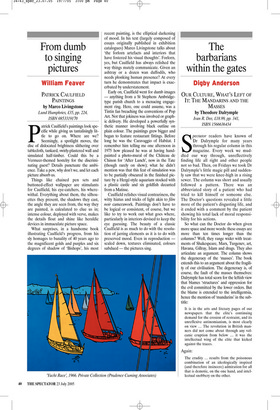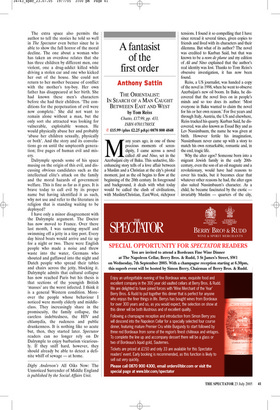The barbarians within the gates
Digby Anderson
OUR CULTURE, WHAT’S LEFT OF IT: THE MANDARINS AND THE MASSES by Theodore Dalrymple Ivan R. Dee, £18.99, pp. 341, ISBN 1566636434 Spectator readers have known of Dr Dalrymple for many years through his regular column in this magazine. Every week we muddled our way through, unreflectively finding life all right and other people not so bad. Then, on Fridays we took Dr Dalrymple’s little magic pill and suddenly saw that we were knee-high in a rising sewer. The column was short and usually followed a pattern. There was an abbreviated story of a patient who had tried to kill himself or someone else. The Doctor’s questions revealed a little more of the patient’s disgusting life, and it ended with a comment by the patient showing his total lack of moral responsibility for his actions.
So what can the Doctor do when given more space and more words: these essays are more than ten times longer than the columns? Well, they range wider with treatments of Shakespeare, Marx, Turgenev, art, Havana, Gillray, Islam and drugs. They also articulate an argument. The column shows the degeneracy of the ‘masses’. The book extends this to an argument about the fragility of our civilisation. The degeneracy is, of course, the fault of the masses themselves: Dalrymple has total scorn for the leftish view that blames ‘structures’ and oppression for the evil committed by the lower orders. But the blame is extended to the intelligentsia, hence the mention of ‘mandarins’ in the subtitle:
It is in the arts and literary pages of our newspapers that the elite’s continuing demand for the erosion of restraint, and its unreflexive antinomianism, is most clearly on view ... The revolution in British manners did not come about through any volcanic eruption from below ... it was the intellectual wing of the elite that kicked against the traces.
Again:
The crudity ... results from the poisonous combination of an ideologically inspired (and therefore insincere) admiration for all that is demotic, on the one hand, and intellectual snobbery on the other.
The extra space also permits the author to tell the stories he told so well in The Spectator even better since he is able to show the full horror of the moral decline. The one about a woman who has taken an overdose relates that she has three children by different men, one violent, one a drug-addict killed while driving a stolen car and one who kicked her out of the house. She could not return to her mother because of conflict with the mother’s toy-boy. Her own father has disappeared at her birth. She had known these men’s characters before she had their children. ‘The conditions for the perpetuation of evil were now complete.’ She did not want to remain alone without a man, but the only sort she attracted was looking for vulnerable, exploitable women. He would physically abuse her and probably ‘abuse her children sexually, physically or both’. And the story and its convolutions go on until the umpteenth generation; five pages of human evil and misery.
Dalrymple spends some of his space musing on the origin of this evil, and discussing obvious candidates such as the intellectual elite’s attack on the family and the moral hazards of government welfare. This is fine as far as it goes. It is brave today to call evil by its proper name but having identified it as such, why not use and refer to the literature in religion that is standing waiting to be deployed?
I have only a minor disagreement with the Dalrymple argument. The Doctor has now moved to France. Over there last month, I was sunning myself and swimming off a jetty in a tiny port. Every day hired boats would arrive and tie up for a night or two. There were English people who made a noise and threw waste into the water, Germans who shouted and guffawed into the night and Dutch people who spread their tables and chairs across the jetty, blocking it. Dalrymple admits that cultural collapse has now reached Paris but his thesis is that sections of the youngish British ‘masses’ are the worst infected. I think it is a general Western condition. Moreover the people whose behaviour I noticed were mostly elderly and middleclass. They increasingly share in the promiscuity, the family collapse, the careless indebtedness, the HIV and chlamydia, the rudeness and public drunkenness. It is nothing like so acute but, then, they started later. Spectator readers can no longer rely on Dr Dalrymple to enjoy barbarism vicariously. If they sniff hard, however, they should already be able to detect a definite whiff of sewage — at home.
















































 Previous page
Previous page